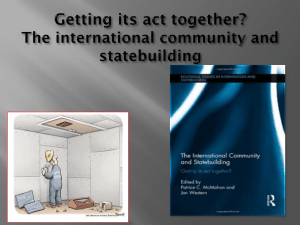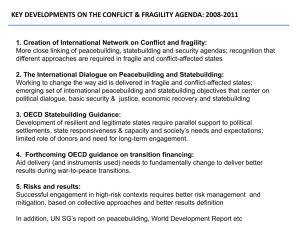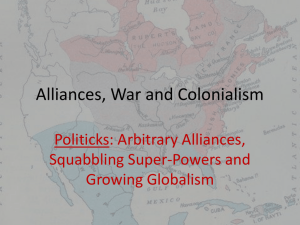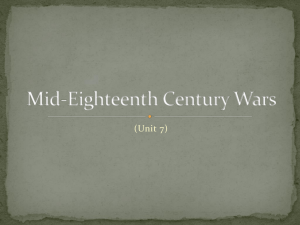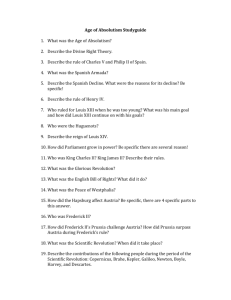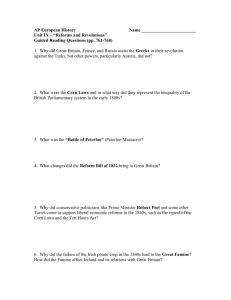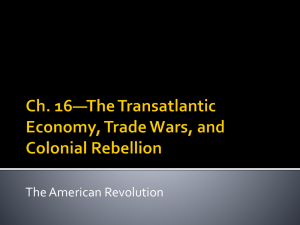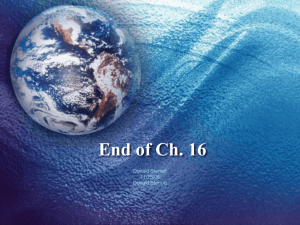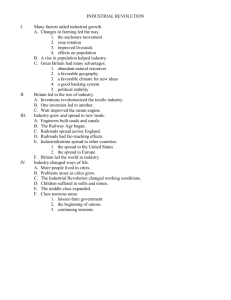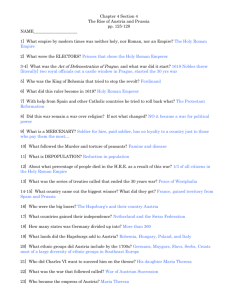Chapter 15
advertisement
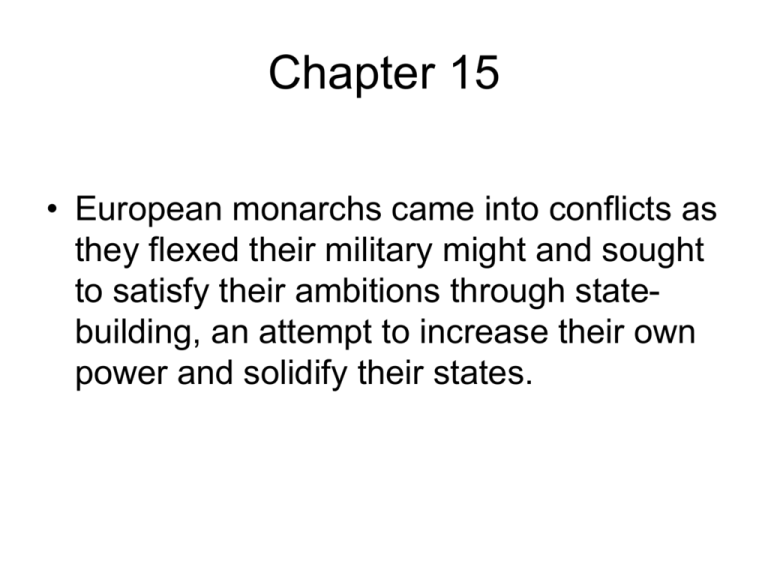
Chapter 15 • European monarchs came into conflicts as they flexed their military might and sought to satisfy their ambitions through statebuilding, an attempt to increase their own power and solidify their states. Statebuilding and War • Rising Ambitions in Eastern Europe – New Leadership in Expanding Russia • The nobility took back some of the authority it had lost to Peter – Catherine the Great • Her family married her to Peter III • She conspired with officers, who assassinated him and declared Catherine tsarina of Russia • She defeated the Turks in 1774 – The Partition of Poland • Russia, Prussia, and Austria divided Poland among themselves Statebuilding and War • Rising Ambitions in Eastern Europe (Cont.) – Forging a Military State in Prussia • Fredrick William I was obsessed with the military • 70 percent of the state’s budget went to the armed forces • He required all men to register for military service – Austria Tries to Hold On • Austria contained a complex array of language groups • Austria could barely control Hungary • Maria Theresa could afford only a relatively small army Statebuilding and War – The Midcentury Land Wars • Fredrick marched his troops into Silesia • He forged alliances with other German states against Austria – The Diplomatic Revolution • Fredrick signed an alliance with Great Britain, and Maria Theresa solidified a new alliance with France • The shift of alliances transformed former enemies into friends • Warfare in the Eighteenth Century Statebuilding and War • Western Europe and the Great Colonial Rivalry – The French Monarchy in Decline • People criticized Louis XIV for dragging France into foreign conflicts • After Louis’s death in 1715, France’s parlements angled for a restoration of the powers – Making the British System Work • House of Lords – nobles, House of Commons – commoners • Parliament controlled taxation, lawmaking, and the process for bringing grievances to the monarchy Statebuilding and War – Colonies, Trade, and War • France and Britain fought over colonies, and made their greatest profits from trade across the Atlantic. • British colonists’ expansion and resistance from local tribes, led to savage battles. – The Triangle of Trade • Europe, Africa, and the Americas • Sugar, rum, coffee, and dyestuffs Statebuilding and War – The Slave Trade • Ships from Europe carried manufactured goods and gin to western Africa and traded them for slaves – Fighting on Three Continents • The War of the Austrian Succession • The French an Indian War • The Seven Years War Chapter 15 • In spite of declining monarchies in Britain and France, royals in other countries maintained their authority by justifying their rule in terms of enlightened absolutism. – Fredrick the Great • He knew and spoke the phrases of the Enlightenment • He initiated codification of the laws, abolished torture, and ended most capital punishment – Joseph II – Style, Substance, or Survival? • Monarchs found it easier to manifest their “enlightenment” in style rather than substance Chapter 15 • Social and economic changes paralleled the ambitious politics and wars in Western societies, especially in the countryside, improving some lives but plunging others into poverty. Changes in Country and City Life • The Agricultural Revolution – New Crops and Techniques • In Holland and Britain, farmers began experimenting with clover, turnips, potatoes, and legumes • Farmers used new crops to feed livestock, and more cattle meant more dairy products – Enclosures • Landowners enclosed land with fences, hedges, and walls • Manufacturing Spreads in the Countryside: Cottage Industry Changes in Country and City Life • More People, Longer Lives – Population Growth • Europe’s population jumped from approximately 110 million in 1700 to 190 million in 1800 – Eighteenth-Century Medicine • Inoculation against smallpox • They learned to treat soldiers for shock before operating, and to clean wounds • Deepening Misery for the Poor • Prosperity and the Bourgeoisie Chapter 15 • While aristocratic and royal patronage of the arts was still crucial, the audiences for culture expanded as artistic styles and cultural forms were changing and reflected a “cult of sensibility.” The Culture of the Elite: Combining the Old and the New • The Advent of the Modern Novel • Robinson Crusoe, Moll Flanders, Pamela, Virtue Rewarded, Tom Jones, Evelina, Young Lady’s Entrance • Pride and Sentiment in Art and Architecture • Antoine Watteau, Jean-Baptiste Greuze, William Hogarth • Reaching New Heights in Music – Baroque Music • Johann Sebastian Bach created great music for organ, harpsichord, clavichord, orchestra, and chorus; and wrote 46 operas • George Fredric Handel wrote instrumental and vocal music The Culture of the Elite: Combining the Old and the New – The Classical Style • Franz Joseph Haydn wrote more than a hundred symphonies • Wolfgang Amadeus Mozart composed more than 600 works and excelled in all forms; symphonies, piano concertos, and operas • The Grand Tour Chapter 15 • The lower classes had their own forms of culture which helped to foster a common identity and often revolved around religion, festivals, and oral traditions, although literacy was rising. Culture for the Lower Classes • Festivals and Popular Literature • Gin and Beer • All the social classes also engaged in drinking wine, brandy, gin, or beer. • Religious Revivals – Pietism • Religious revivals spread from community to community • John Wesley Chapter 15 • The first major event to upset the social and political stability of the West took place as Britian’s North American colonies fought to free themselves from British rule. • Insults, Interests, and Principals: The Seeds of Revolt – New Commercial Regulations and Taxes • The Stamp Act of 1765 taxed printed documents such as newspapers, pamphlets, and wills Foreshadowing Upheaval: The American Revolution • A War for Independence • The Second Continental Congress appointed George Washington its military commander • On July 4, 1776 Congress issued the Declaration of Independence, written primarily by Thomas Jefferson • Treaty of Paris in 1783 • Creating the New Nation – War for Independence or Revolution?
